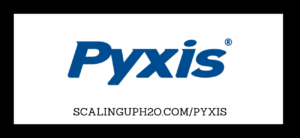 Hello Scaling UP! Nation, August is Legionella Awareness Month, and we’re excited to bring you in-depth insights on this crucial topic. Usually, we bring you four episodes every August, but this year, you’re in luck! With five Fridays this month, we have five episodes packed with valuable information for you. Today, podcast host Trace Blackmore, CWT, is here to answer your pressing questions about Legionella. As industrial water treaters, you are the heroes in the fight against Legionella, protecting your communities and clients against this dangerous bacteria. Scaling up your Legionella knowledge is a great way to celebrate Legionella Awareness Month, and to support you, we’ve created a free Legionella resources page at www.ScalingUpH2o.com/Legionella
Hello Scaling UP! Nation, August is Legionella Awareness Month, and we’re excited to bring you in-depth insights on this crucial topic. Usually, we bring you four episodes every August, but this year, you’re in luck! With five Fridays this month, we have five episodes packed with valuable information for you. Today, podcast host Trace Blackmore, CWT, is here to answer your pressing questions about Legionella. As industrial water treaters, you are the heroes in the fight against Legionella, protecting your communities and clients against this dangerous bacteria. Scaling up your Legionella knowledge is a great way to celebrate Legionella Awareness Month, and to support you, we’ve created a free Legionella resources page at www.ScalingUpH2o.com/Legionella
Understanding Legionella: Common Questions Answered
What is the difference between Legionella and Legionnaires’ disease?
Legionella is a bacteria responsible for Legionnaires’ disease, a type of pneumonia that comes from getting ill after being exposed to Legionella. It thrives in water and poses significant health risks. Legionnaires’ disease was discovered in the mid 1970’s after several attendees of the American Legion convention got sick after attending the convention.
How does a person get Legionnaires’ disease?
Inhaling water contaminated with Legionella bacteria can lead to infection.
What are the symptoms of Pontiac Fever or Legionnaires’ disease?
Early symptoms mimic the flu, but more severe pneumonia-like symptoms can develop. Look out for high fever, cough, difficulty breathing, chills, and diarrhea.
How common is Legionnaires’ disease?
Per the CDC, in 2015 there were approximately 6,000 cases reported in the United States.
Who is at higher risk for developing Legionnaires’ disease?
While most people have resistance, fewer than 5 in 100 exposed individuals may develop the disease. High-risk groups include older adults, smokers, and those with weakened immune systems.
How does Legionella enter buildings?
Legionella enters through a building’s makeup water. This is why we need to test the water coming into a building’s system and also set up a program to test within the system so we know what to do and respond appropriately if a test comes back positive for Legionella bacteria.
What promotes Legionella growth?
Biofilm, temperature fluctuations, inadequate disinfectant levels, and water stagnation within building water systems can promote Legionella growth
What are Water Management Programs (WMPs)?
WMPs are designed to identify hazardous conditions and minimize the growth and spread of waterborne pathogens, including Legionella, in building water systems.
How Should I Discuss Legionella Testing Frequency with a Client Who Only Wants to Test Once a Year?
When discussing Legionella testing with a client who only wants to test once a year, emphasize the importance of more frequent testing for safety and compliance. Here’s how to approach the conversation:
- Encourage Regular Testing:
I always encourage people to test for Legionella at least every season or quarter. Regular testing helps identify potential issues early, ensuring the safety of your water system. - Refer to the Water Management Plan (WMP):
It’s crucial to refer back to your Water Management Plan (WMP) to understand the necessary steps if a test comes back positive for Legionella bacteria. - Develop a Comprehensive Plan:
Let’s come up with a plan outlining what we are going to test, how often we will test, and how we will use the data. We should also decide how to handle positive results, particularly for different Legionella species. Taking some time to plan upfront will streamline the process when collecting water samples.
By emphasizing the benefits of regular testing and a proactive approach, you can help clients understand the importance of more frequent Legionella testing and the value of a detailed WMP.
Where can I find more information?
On our Scaling UP! H2O Legionella Resources Page at www.ScalingUpH2o.com/Legionella there you’ll find Legionella resources collected from the CDC, ASHRAE, OSHA, ASPE, WHO, ASSE, APIC, AIHA, ANSI, ASDWA, AWT, CMS, and others along with our prior Legionella podcast episodes, Legionella Legislation, and Legionella videos.
Upcoming 2024 Legionella Awareness Month Episodes:
This month, we have a special lineup of episodes focusing on Legionella, featuring expert guests who will share their insights:
Episode 376: Dr. Janet Stout, PhD
Episode 377: Michael Loewenstein
Episode 378: Dr. Alberto Comazzi, PhD
Episode 379: Loraine Huchler
Stay tuned, and let’s scale up our knowledge together to combat Legionella and ensure safer water systems.
Thank you for being a part of the Scaling UP! H2O community.
Thank you for celebrating Legionella Awareness Month with us.
The Scaling UP! H2O Team
Timestamps
01:00 – Trace Blackmore welcomes you to Legionella Awareness Month
03:00 – Upcoming Events for Water Treatment Professionals
06:00 – Answering Legionella Questions
31:15 – Drop by Drop With James McDonald
Quotes
“I always encourage people to test for Legionella at least every season or quarter. It’s crucial to refer back to your Water Management Plan (WMP) to know the necessary steps to take if your test comes back positive for Legionella bacteria.” – Trace Blackmore
“Let’s come up with a plan for what we are going to test, how often we are going to test, and what we are going to do with that data, and if we do get a positive what you want to handle that if we get certain species. Take some time upfront and then get the water sample.” – Trace Blackmore
Connect with Scaling UP! H2O
Submit a show idea: Submit a Show Idea
LinkedIn: in/traceblackmore/
YouTube: @ScalingUpH2O
Read and Download Trace Blackmore’s Discussion Guide HERE
Links Mentioned
Ep 355
Ep 227
Drop By Drop with James
In today’s episode, I have another “what if” for you. What if industrial water treatment did not exist. I mean no industrial water treatment equipment, no industrial water treatment chemistry, no industrial water treatment knowledge, and no people practicing the industrial water treatment profession. How would the world we live in be different? What would the rivers, lakes, oceans, and even skies look like? What would our standard of living be like? How would our health be impacted? What would be the impact upon the cost of goods if industrial water treatment did not exist? Thinking in such an extreme as this really makes one appreciate what it is we industrial water treatment professionals truly bring to the world.
2024 Events for Water Professionals
Check out our Scaling UP! H2O Events Calendar where we’ve listed every event Water Treaters should be aware of by clicking HERE.

